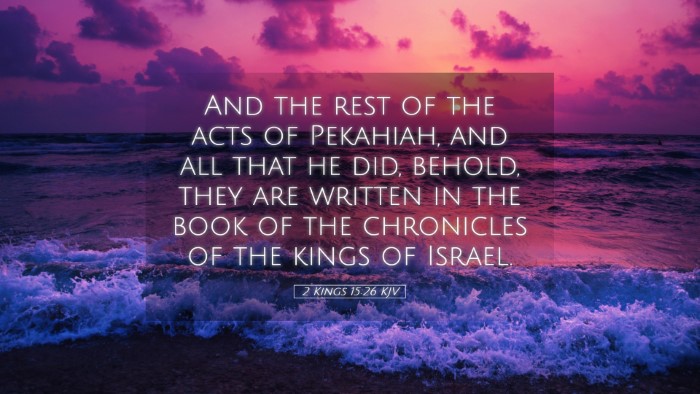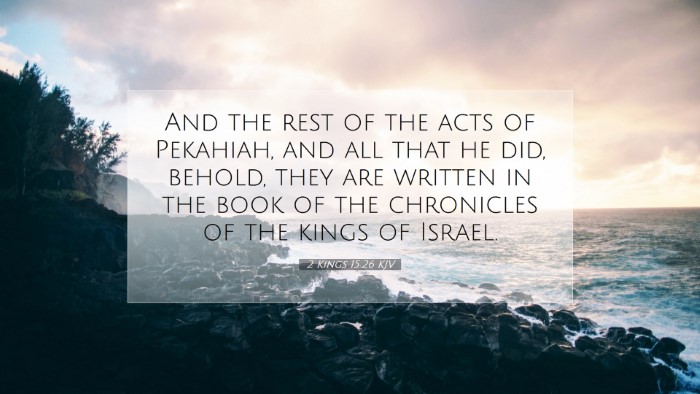Commentary on 2 Kings 15:26
Text of 2 Kings 15:26 (KJV):
“And the rest of the acts of Pekahiah, and all that he did, are they not written in the book of the chronicles of the kings of Israel?”
This verse serves as a conclusive statement regarding the reign of King Pekahiah of Israel, an important figure in the historical narrative of the Israelite monarchy. The brevity of this verse indicates a transition and reflects on the manner in which biblical writers summarize their accounts of kings, focusing on crucial aspects of their reigns and the overarching significance of their actions within the history of Israel.
Historical Context
Pekahiah was the son of Pekah and reigned during a tumultuous period characterized by political instability and moral decay in Israel. Commentaries, such as those by Matthew Henry, emphasize that this verse reminds the reader of the enduring historical records maintained in the chronicles of Israel, which document the deeds of these kings and their spiritual standings before God.
The Significance of Chronicles
Matthew Henry points out that the mention of the “book of the chronicles” is crucial for understanding Israel's history. These chronicles, which are now largely lost, contained detailed accounts of the kings' reigns, their actions, and the state of the nation. Importantly, they served as a reminder to the Israelites of their covenant with God and the consequences of their disobedience.
Albert Barnes elaborates on this by noting that such records were not mere historical documents but were meant to carry theological significance. The chronicler’s intent was to portray the spiritual state of the nation under each king's rule. The deeds of Pekahiah, while summarized here, reflect the broader moral landscape during his reign—an era marked by idolatry and disloyalty to God.
Pekahiah's Reign and Legacy
Exegetical insights provided by Adam Clarke offer a deeper understanding of Pekahiah himself. Not much is said about his achievements, but this verse implies that his reign lacked the notable actions or reforms that characterized the leaders who genuinely sought the welfare of their nation. The absence of significant deeds leads to an implicit critique of his leadership, as the annals of history rarely remember those who fail to uphold righteousness.
Theological Implications
This verse invites reflection on the nature of legacy and the criteria by which the scriptures evaluate leaders. The idea that a king’s legacy is important because it reflects his faithfulness to God resonates throughout the biblical narrative. Leaders in the biblical context were judged, not solely on their military successes or political strategies but, more importantly, on their allegiance to Yahweh and His commandments.
Spiritual Lessons for Today
For modern-day readers, particularly for pastors and theologians, the verse serves as a sobering reminder of the importance of living out one's faith with integrity. Here are several lessons derived from this brief account:
-
Evaluation of Leadership: Like Pekahiah, leaders today should be evaluated not just on results but on their character and commitment to God’s covenant.
-
Recording Our Acts: Just as the chronicles recorded the deeds of kings, our actions are noteworthy in God’s eyes. How we live can serve to reflect our faith.
-
Importance of Historical Context: Understanding the context of biblical history can illuminate how God moves through human events and how nations rise and fall based on their fidelity to Him.
-
Legacy Matters: The lasting impact of our decisions and leadership influences future generations. We are called to create a legacy that honors God.
-
Calls to Repentance: The history of Israel illustrates the need for repentance among God's people. Observing the failures of leaders like Pekahiah beckons us to seek true alignment with God’s will.
-
Scriptural Reflection: This verse encourages readers to engage with the Scripture regularly, understanding that every detail has a purpose and meaning in the narrative of God’s redemptive plan.
-
Endurance of God’s Record: Finally, while human records may fade, God’s record of our deeds endures, calling us to live responsibly and faithfully in the sight of our Creator.
Conclusion
In summary, 2 Kings 15:26 encapsulates profound lessons on leadership, accountability, and fidelity to God. The brief note on Pekahiah serves as a poignant reminder that history evaluates our lives, and our foremost concern should be to honor God through every action and decision. As we study such verses, let us be inspired to cultivate a legacy that tells of a life lived in genuine devotion to our Lord.


